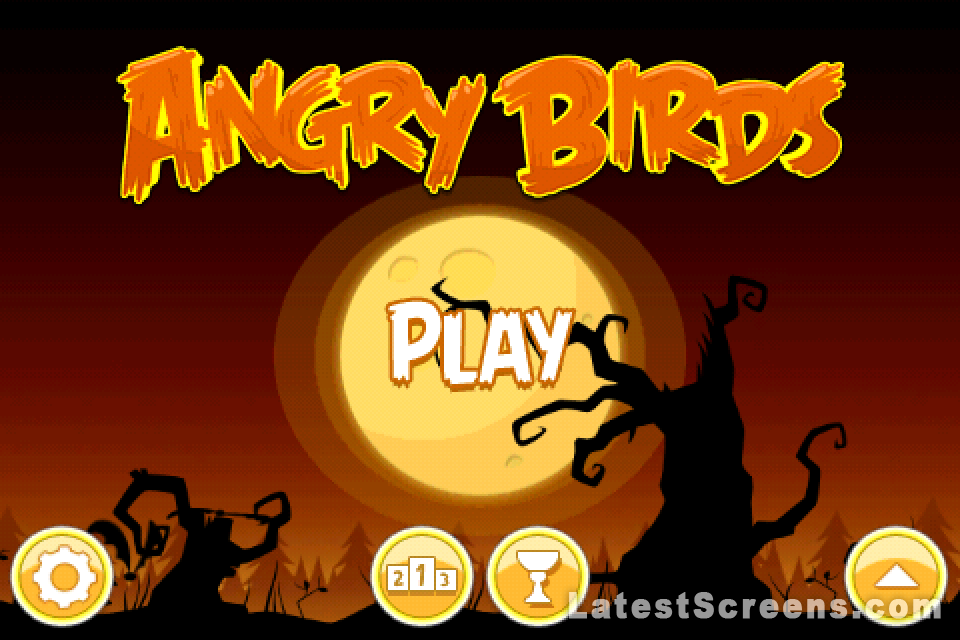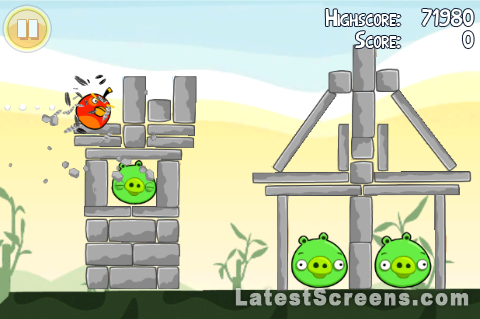Why are your kids better than you at Angry Birds?

There is a phenomenon attached to the incredibly popular mobile gaming apps in the Angry Birds series that has some adults scratching their heads, and their kids laughing. It seems that children are better at the game than adults, finding the puzzles that always stump their parents to be a snap. Part of that has to do with spatial reasoning and how kids view the world, but the other part? That is the question, and a recent survey conducted by AVG Security may have the answer.
The Angry Birds games recently hit a major milestone, having been downloaded a total of 200 million times on various platforms, which pretty much locks them into the "Hot Game" category. The Angry Birds gaming franchise, which consists of the games Angry Birds , Angry Birds Seasons and Angry Birds Rio , has seen a steady number of downloads in the first half of the year so far, and all of the games are available on major smartphone platforms, with PC and Mac versions also in the market.
"We have seen more growth and engagement with Angry Birds games and merchandise across all markets," said Mikael Hed, CEO of Rovio. "The growing numbers of fans give us more incentive to keep creating more fresh, fun and engaging Angry Birds experiences and making them available to everyone."
Last week, Angry Birds was launched in the web for the first time in the Chrome Web Store. The game can be played in a web browser, and offline play is available when installed from the Chrome Web Store. The web version attracted 6 million individual fans of the game in less than a week.
Love Your Game, Love Your Kids
One of the most interesting aspects of the Angry Birds franchise is the challenge in certain levels that are so easy a kid can do them... But their parents cannot.
When adults play the game and get stuck -- and that happens in a very predictable way (cough 4-14 cough) -- they don't get angry at the birds, or turn off the app, they turn to their kids instead. It turns out that gamers under 15 have a much easier time with that puzzle and others in the game, turning your kids into the go-to source for this game -- but this poses an interesting question -- why?
It may have something to do with how activities like gaming are perceived. Using the iPhone as a babysitter on long car trips is often the Number 2 use for the phone for most parents, following the Number 1 use -- making and receiving phone calls -- but the fact that they spend more time on the games may not be the reason why they are better at figuring out the puzzles that make up the levels in Angry Birds.
"Children tend to concentrate harder on the things that attract their attention, and the games certainly do that," Child Psychologist and gaming researcher Jessica Sullivan says. "With Angry Birds it is not just the games, there are stuffed animals, stickers, and all of the other trappings of a strong fad of the sort that appeals to children, and the fact that they master the games quickly is not all that surprising."
The AVG study polled 2,200 mothers in several developed countries, revealing among other things that 76% of children between the ages of 4 and 5 could play an online computer game, 34% could open a Web browser, and that 22% knew at least one Web address.
To put that into perspective for you, only 1% of the same kids knew how to dial 9-1-1 in an emergency, while only 35% could get their own breakfast -- and a surprisingly low 53% knew their home address, suggesting that kids that young find online computer games more interesting than their own address!
The answer behind this phenomenon may be more complicated -- and yet simpler -- than you might suspect: it is a game .
Dr. Margot Sunderland, author of The Science of Parenting explains that when playing games, children must start with a conscious awareness of the activity; that is, they pay very close attention to what is happening in the game. Throughout the game they extract meaning from all of the information their brain is receiving, which results in a rapid and often correct strategy and plan directing their next move.
Ultimately the act of playing the game -- for a child -- is a whole-brain experience to which they commit almost their total attention, and that is why we perceive them as being better at these games than we are. They are not actually better, they are just more willing to commit their attention to the game, and to concentrate upon finding a solution to the puzzle, something that most adults cannot do without significant effort.
A case can be made that their brains are wired to process data like that and to pay closer attention to the events around them, because that is all true. That special wiring that allows them to soak up information and process it changes when their brain naturally rewires itself as they age, but recent research suggests that the rewiring process that was thought to begin when children reach their early 20's may be starting a lot sooner now.

At birth, a baby's brain contains 100 billion neurons, and as the neurons mature, more and more synapses are made. At birth that number is around 2,500 synapses per neuron, but by age two or three it explodes to around 15,000 per neuron, and it keeps growing as more information is absorbed.
While the brain eliminates connections that are seldom or never used -- that being a normal part of brain development -- new experiences that are highly valued are given more priority by the brain, and so more information is retained about them.
The problem-solving functions in these games are given a higher priority by kids, who may not be closing out the retention process as early as they normally would, which explains why they grow increasingly more confident with computers and gaming than the adults around them, who never had the opportunity to build those circuits when they were young. If you ever wondered why you are better at games than some of your mates, that is why.
The research suggests that the data formations that occur in the first decade of life are the strongest in the brain, and while there is not enough data to make it official, the suspicion is that these early experiences may be why as adults we excel in certain careers or jobs and not in others. Looking at it from that perspective, you may be creating the next generation of games developers when you hand your iPhone to your child and let them play Angry Birds!
As for Angry Birds -- the news is good on that front, as currently Rovio is busy creating a social game around the series, expanding to new areas of the entertainment business, and preparing for more growth throughout 2011, which means your kids will have lots of new puzzles to solve, and more green evil pigs to conquer.


No comments yet. Tell us what you think to be the first.